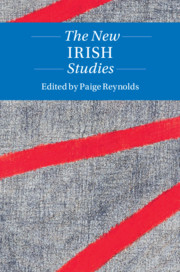Book contents
- The New Irish Studies
- Twenty-First-Century Critical Revisions
- The New Irish Studies
- Copyright page
- Contents
- Notes on Contributors
- Acknowledgments
- Introduction
- Part One Legacies
- Chapter 1 People: Race and Class on the Contemporary Irish Stage
- Chapter 2 Nation: Reconciliation and the Politics of Friendship in Post-Troubles Literature
- Chapter 3 Migration: Migrant Artists Changing the Rules in Post-Celtic Tiger Ireland
- Chapter 4 Language: “World Literature” and Contemporary Irish-Language Writing
- Chapter 5 Land: Neoliberal Wastelands in Contemporary Postapocalyptic Irish Cinema
- Part Two Contemporary Conditions
- Part Three Forms and Practices
- Index
Chapter 3 - Migration: Migrant Artists Changing the Rules in Post-Celtic Tiger Ireland
from Part One - Legacies
Published online by Cambridge University Press: 18 September 2020
- The New Irish Studies
- Twenty-First-Century Critical Revisions
- The New Irish Studies
- Copyright page
- Contents
- Notes on Contributors
- Acknowledgments
- Introduction
- Part One Legacies
- Chapter 1 People: Race and Class on the Contemporary Irish Stage
- Chapter 2 Nation: Reconciliation and the Politics of Friendship in Post-Troubles Literature
- Chapter 3 Migration: Migrant Artists Changing the Rules in Post-Celtic Tiger Ireland
- Chapter 4 Language: “World Literature” and Contemporary Irish-Language Writing
- Chapter 5 Land: Neoliberal Wastelands in Contemporary Postapocalyptic Irish Cinema
- Part Two Contemporary Conditions
- Part Three Forms and Practices
- Index
Summary
This chapter surveys recent Irish works by migrant artists including theatre company Outlandish Theatre (OT) Platform, novelists Ifedinma Dimbo and Ebun Joseph, filmmaker Jijo Sebastian, poet/activist Christiana Obaro, and visual artist Vukasin Nedeljkovic. As an ensemble, these artists thematically rehearse similar terrain: the hyper in/visibility of racialized female migrants, the abuses experienced by those seeking asylum, gendered inequality and violence against and within migrant communities. This chapter focuses attention not only on the works themselves but on a few recurring contexts through which significant migrant arts practice has emerged. These include collaborative arts practices that pair professional and nonprofessional collaborators, self-publishing, and activist work – all contexts that present challenges for the work gaining critical traction due to the work’s perceived lack of professionalism.
Keywords
- Type
- Chapter
- Information
- The New Irish Studies , pp. 63 - 79Publisher: Cambridge University PressPrint publication year: 2020
- 3
- Cited by

